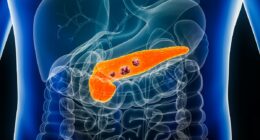Share this @internewscast.com
Millions of women taking the mini-pill could be at increased risk of developing a brain tumour, new research suggests.
Experts found that women taking the progestogen-only pill—often dubbed ‘the mini-pill’ continuously for more than five years were more likely to develop a meningioma.
Meningiomas accounts for a third of all brain tumours diagnosed in the UK each year.
While usually non-cancerous they can still cause problems they grow larger inside the brain.
In the new study, French researchers analysed data from over 8,000 women, with an average age of 60, who had surgery for this form of tumour.
They found women who did were more likely to have been taking the mini pill—medically called desogestrel for at least five years.
However, independent experts have said women on the medication shouldn’t panic, as the increased risk is relatively small.
Desogestrel, in contrast to the more famous Pill, only contains one sex hormone progestogen.
It is primarily taken by women with underlying health conditions that makes taking other contraceptives dangerous, or who suffer adverse side effects when doing so.

Researchers found that taking what is known as the ‘mini pill’ continuously for more than five years increased risk of developing a meningioma

The NHS says natural family planning can be up to 99 per cent effective when done correctly and around 75 per cent if not used according to instructions. By comparison, the Pill, implant, IUS and IUD are 99 per cent effective with perfect use, while condoms are 98 per cent
While the increased risk of a meningioma was observed, the authors—who published their findings in the British Medical Journal —said it was relatively minor.
They outlined that only one out of 67,000 women taking desogestrel will develop a meningioma requiring surgery.
The scientists also found that there was no increased risk when the mini pill was used for less than five years.
They also found that the increased risk disappeared a year after coming off the mini pill.
Meningiomas are a tumour of the membrane that surrounds the brain, with more than 90 per cent of these are not cancerous.
While not at risk of spreading elsewhere in the body like a cancerous growth they can still cause patients problems.
Every year proportion of meningioma patients will need surgery to remove the tumour due to it causing increased internal pressure on the brain.
Common symptoms of a meningioma include a persistent headache as well as constant nausea which is often accompanied with drowsiness.
Dr Mangesh Thorat, an expert in population health at Queen Mary University of London, who was not involved in the study, said women on the medication shouldn’t be alarmed.
‘The magnitude of increase in the risk is small, and short-term use is not associated with increased risk and that the excess risk ceases to exist once the use is stopped for more than a year,’ he said.
He advised women who may be concerned about their risk to contact their GP.
‘Talk to your healthcare provider regarding the drug you are using. If it is associated with an increased risk of meningioma, this can be changed to a safer alternative,’ he said.

The proportion of women taking oral contraceptives has fallen by more than two-thirds, from 420,600 in 2012/13 to 126,400 in 2022/23, according to the NHS data. Around 555,400 women turned to the health service’s sexual and reproductive health services in 2022/23—equivalent to four per cent of 13 to 54-year-olds
Experts say that a limitation of the study is that the researchers only looked at one type of progestogen pill—desogestrel and not other drugs that also include the hormone.
Dr Thorat said: ‘the study cannot provide information on the formulations not commonly used in France but used in other countries.’
He has called on further studies to be undertaken in different countries.
Figures currently suggest around 6 per cent of women aged 16 to 49 use the mini pill in the UK—roughly 3.1 million patients.
Taken every day, it works by thickening cervical mucus and thinning the womb lining which helps stop sperm reaching an egg and from a fertilised egg attaching itself in the womb.
In some cases, the mini pill can also stop ovulation from occurring.
It is 99.7 per cent effective with perfect use but if used incorrectly—such as missing a pill or experiencing nausea and diarrhoea while on it—around one in ten women (9 per cent) may get pregnant.
Known side effects of the mini pill—proven to be over 99 per cent effective at stopping pregnancy—include nausea, breast tenderness, mood swings and headaches.
Others claim they pile on pounds while taking the drug because of increased fluid retention and appetite.
However, the NHS says there is no evidence it leads to weight gain.
The latest study comes just a month after British scientists found that women with asthma who are taking the mini pill were a third more likely to suffer an attack.











